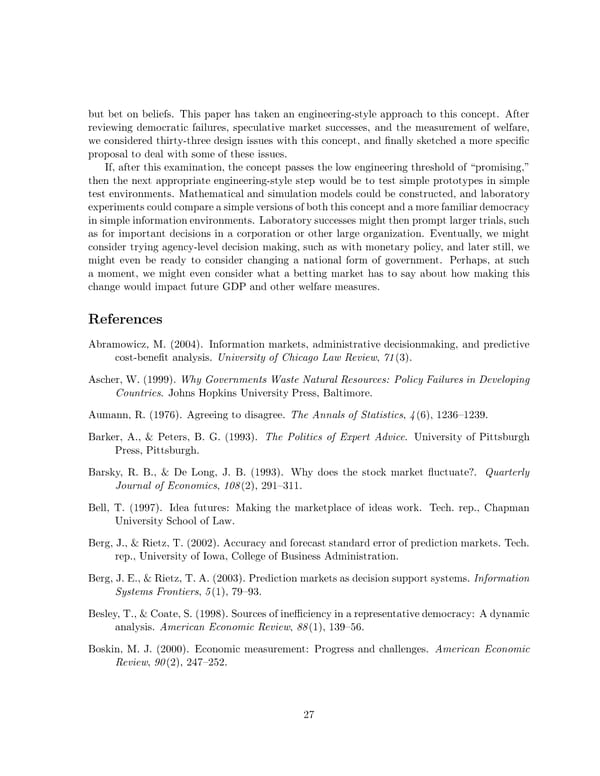but bet on beliefs. This paper has taken an engineering-style approach to this concept. After reviewing democratic failures, speculative market successes, and the measurement of welfare, we considered thirty-three design issues with this concept, and finally sketched a more specific proposal to deal with some of these issues. If, after this examination, the concept passes the low engineering threshold of “promising,” then the next appropriate engineering-style step would be to test simple prototypes in simple test environments. Mathematical and simulation models could be constructed, and laboratory experimentscouldcompareasimpleversionsofboththisconceptandamorefamiliardemocracy in simple informationenvironments. Laboratorysuccesses mightthen prompt largertrials, such as for important decisions in a corporation or other large organization. Eventually, we might consider trying agency-level decision making, such as with monetary policy, and later still, we might even be ready to consider changing a national form of government. Perhaps, at such a moment, we might even consider what a betting market has to say about how making this change would impact future GDP and other welfare measures. References Abramowicz, M. (2004). Information markets, administrative decisionmaking, and predictive cost-benefit analysis. University of Chicago Law Review, 71(3). Ascher, W. (1999). Why Governments Waste Natural Resources: Policy Failures in Developing Countries. Johns Hopkins University Press, Baltimore. Aumann, R. (1976). Agreeing to disagree. The Annals of Statistics, 4(6), 1236–1239. Barker, A., & Peters, B. G. (1993). The Politics of Expert Advice. University of Pittsburgh Press, Pittsburgh. Barsky, R. B., & De Long, J. B. (1993). Why does the stock market fluctuate?. Quarterly Journal of Economics, 108(2), 291–311. Bell, T. (1997). Idea futures: Making the marketplace of ideas work. Tech. rep., Chapman University School of Law. Berg, J., & Rietz, T. (2002). Accuracy and forecast standard error of prediction markets. Tech. rep., University of Iowa, College of Business Administration. Berg, J. E., & Rietz, T. A. (2003). Prediction markets as decision support systems. Information Systems Frontiers, 5(1), 79–93. Besley, T., & Coate, S. (1998). Sources of inefficiency in a representative democracy: A dynamic analysis. American Economic Review, 88(1), 139–56. Boskin, M. J. (2000). Economic measurement: Progress and challenges. American Economic Review, 90(2), 247–252. 27
 Shall We Vote on Values, But Bet on Beliefs? Page 28 Page 30
Shall We Vote on Values, But Bet on Beliefs? Page 28 Page 30